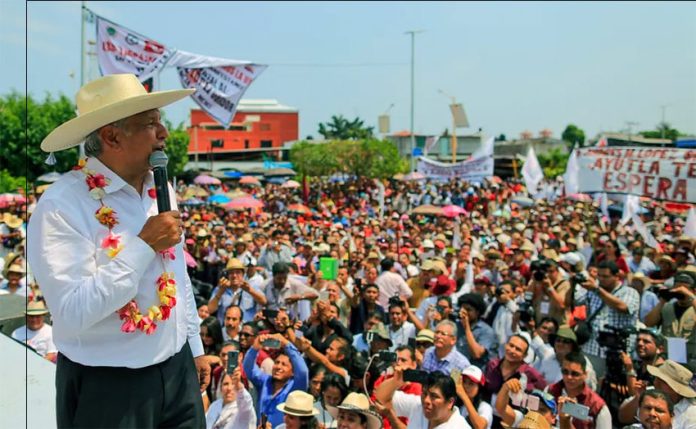From the start of Mexico’s latest general election campaign, left-wing candidate Andrés Manuel López Obrador (or “AMLO”) has for weeks been the clear favourite to win.
This is his third attempt to win the presidency, and once again he’s running with an agenda focused on curbing corruption and poverty – the combination of which, he argues, is the fundamental cause of Mexico’s social unrest and economic stagnation.
Twelve years after his first try – and the ensuing “war on drugs” strategy that claimed hundreds of thousands of lives across the country – he has floated a new idea to pacify the nation: an amnesty for people involved in drug-related violence.
With the July 1 polling day getting closer, the 64-year-old and his proposals seem to have good support among Mexicans, and he retains a double-digit advantage over his competitors. But his path to the presidency will not be smooth.
At the start of the campaign, López Obrador was up against four other candidates: the incumbent Institutional Revolutionary Party’s (PRI) Jose Antonio Meade; Ricardo Anaya, a member of the conservative National Action Party (PAN) running in coalition with two other parties; and two independent candidates, both former members of traditional parties. One of them, Margarita Zavala, dropped out in May citing her poor chances, while the other, Jaime Rodríguez or “El Bronco,” is polling at less than 3%.
According to most polls, López Obrador could win with up to 50% of the vote, which on the face of it should mean he has little to worry about. But his opponents have at their disposal a variety of ways to thwart his supposedly assured victory.
Some are attempting to rally around a single anti-López Obrador candidate, with the support of the Mexican Business Council, an elite group composed of around 60 of the richest men and women in Mexico. This group has always been against redistributive policies and, by extension, López Obrador’s “poor first” campaigns.
But the clock is ticking, and with the PRI’s campaign failing to gain traction, a new alternative is rising. Some campaign spokespeople have publicly acknowledged that some businessmen have been applying pressure on them to pull out in favour of PAN’s candidate Ricardo Anaya, considering him the only candidate who could plausibly defeat López Obrador.
Even if López Obrador manages to overcome fierce private sector opposition, he may face another hurdle: irrespective of the ultimate turnout and result, the presidential election will have to be validated by an independent tribunal, and local elections as well.
The Electoral Tribunal is crucial for ensuring confidence in the democratic process, but its independence has been contested because of some of its recent rulings – among them the decision to let “El Bronco” run for the presidency in spite of clear evidence that the citizen signatures he gathered to support his candidacy were fraudulent.
Since it has the authority to invalidate the presidential election altogether, the tribunal’s potential vulnerability to compromise or corruption is deeply worrying.
A less likely, but still possible, obstruction to López Obrador’s ambitions is the use of force. In December 2017 the Mexican Congress passed a new home security law ostensibly intended to provide the military with “more certainty” to undertake law enforcement and security tasks amid a continuing battle against criminal organizations.
But the law’s critics have said that this new legal framework will give a free hand to whoever holds power to exert pressure on civilians, repress political opponents or crack down on large-scale demonstrations. The law enables the incumbent president to limit democratic liberties at will.
![]() Victory in the presidential election appears to be a foregone conclusion for López Obrador against corruption and extreme wealth concentration. But Mexico’s opposition parties and monied elites are doing all they can to frustrate his third, and probably last, run for the top job – and to stop him changing the country in ways that don’t suit their interests.
Victory in the presidential election appears to be a foregone conclusion for López Obrador against corruption and extreme wealth concentration. But Mexico’s opposition parties and monied elites are doing all they can to frustrate his third, and probably last, run for the top job – and to stop him changing the country in ways that don’t suit their interests.
Irving Huerta is a PhD student in politics at Goldsmiths, University of London. This article was originally published on The Conversation.
